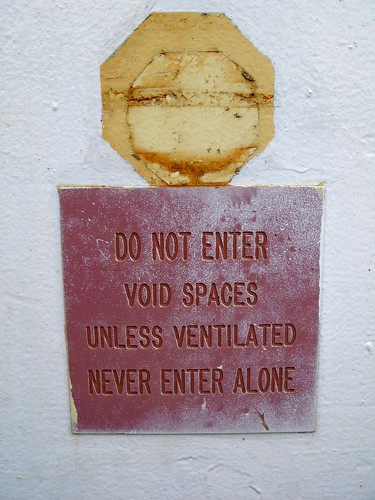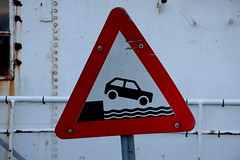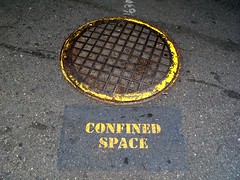

More Warnings from the Ministry of Silly Warnings
In light of Carbon Trust's failed and then revised bicycle policy yesterday, a number of readers have mailed us about similar Health and Safety (H&S) Policies. The thing that binds so many of these policies together - apart from their dodgy scientific foundation - is their claim to "help protect employees from preventable injury".
Who are they kidding? We all know that such restrictive - and often bicycle-unfriendly - policies are designed "to prevent the employer from preventable liability", as one reader put it.
Here is the H&S policy from the University of Florida. The reader who sent it in writes that "It really gets under my skin when the policy lumps bicycles in with motorcycles, scooters/mopeds, and Segways. Segways? Really? Segways? I do not have the words to express my indignation."
You'll love this. Apart from the usual helmet yadayada the University of Florida recommends "A plastic shatter-resistant face shield". Seriously. It can "help protect one's face in a crash".Once again there is a shocking abscence of motoring helmets in this H&S policy. Or recommendations for plastic shatter-resistant face shields for car occupants. Sigh.


If you're in possession of a fun H&S read, do let us know. We'll compile a library of giggles. I can offer up the Ace Hotel in Portland's Document of Bicycle Fear, which is included in this earlier post, just scroll down a bit.
And Richard from Cyclelicio.us tweeted the link to an article about how Britain’s biggest engineering company, Jacobs Babtie, banned staff from travelling on bicycles or motorbikes after declaring them too dangerous.
UFEHS-SAFE1-05/20/09
Environmental Health and Safety - Business Affairs
University of Florida
OBJECTIVE
The purpose of this policy is to help protect University of Florida (UF) employees from preventable injury. The objective is to reduce the risk of employee injury or fatality through the use of appropriate personal protective equipment during operation of motorcycles, scooters/mopeds, Segways, and bicycles while in the course and scope of employment.
AUTHORITY:
Environmental Health and Safety (EH&S) is responsible for safety policy development and for monitoring compliance of UF facilities and operations. EH&S has enforcement authority when dealing with unsafe or non-compliant conditions and with violations of environmental, health, and safety related statutes and regulations.
POLICY:
This policy sets forth the requirements for use of personal protective equipment during operation of motorcycles, scooters/mopeds, Segways and bicycles by UF personnel while in the conduct of official business. All University employees who ride their personal or UF-owned motorcycles, scooters/mopeds, bicycles, or Segways for UF business purposes are required to wear a protective helmet. Employees may use their own personal helmet or a UF-provided helmet that meets DOT or CPSC standards. Use of a personal motorcycle, scooter/moped, Segway or bicycle for travel to and from work or for onsite recreational purposes is not considered “work related;” however, UF employees are strongly encouraged to wear their helmets whenever they ride.
PROCEDURES:
Appropriate protective headgear must be worn by any employee who operates a motorcycle, scooter/moped, Segway, or bicycle on University business as follows:
- Motorcyclists and operators of a moped or scooter must wear a properly fastened helmet that meets the United States Department of Transportation (DOT) FMVSS 218 standards. Helmets that meet FMVSS 218 have a manufacturer-applied sticker on the outside rear of the helmet with the letters “DOT”.
- Bicyclists and Segway operators must wear a U.S. Consumer Product Safety Commission (CPSC) approved bicycle helmet.
- Helmets must be sized to fit the wearer snugly, yet comfortably.
- The helmet should have no obvious defects such as cracks, loose padding or frayed straps. A helmet impacted in an accident must be replaced regardless of its visual condition.
- Keep the helmet securely fastened when riding.
- A plastic shatter-resistant face shield is recommended and can help protect one's face in a crash. It also provides protection from wind, dust, dirt, rain, insects and debris. Eye protection is required under Florida law for anyone operating a motorcycle.




